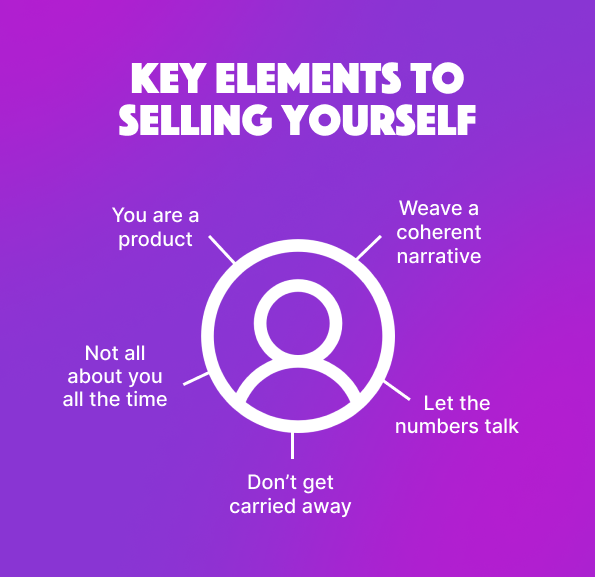
One of the most important points in establishing a career is knowing how to sell yourself. For years, we’d been taught that humility is valued over pride, but that doesn’t mean you should let modesty downplay your achievements. You need to toe the line just right so that you self-promote without coming off as a braggart — and this is what we’re calling the professional humble brag.
Every step in your career requires you to “sell yourself” — it doesn’t start with your job interview. The moment you put together your resume (or CV), you’ve already started the process! This is why creating the perfect resume is important for your career.
Additionally, once you land the role, every day on the job is another day you have to continue showing your higher-ups the value that you bring to the company.
The importance of knowing how and when to be a professional humblebrag is vital. Selling yourself is key in this competitive market. Every company eyes the best talent (though it’s unlikely that EVERY company will be able to secure the best), and the way you position yourself during your interview — as well as after you’re onboarded if you DO get the job — could make or break your career.
Let’s start off by identifying the differences between selling yourself (or professional humble-bragging) and just plain gloating.
Gloating vs. selling yourself
It’s not uncommon for people to conflate the two, but there is quite a bit of nuance involved.
Have a look at the two examples below and take a moment to analyze them yourself before proceeding.
1. I was definitely the best writer in my former company. I would get calls from other agencies looking to hire me all the time. I would turn them down because the company I was employed at kept offering me raises because they didn’t want to lose me.

2. Over a period of three years, I undertook 17 expansive marketing campaigns and personally oversaw the content creation process from conceptualisation to execution. I was able to usher in a 50% increase in traffic to our site this year alone with the content I created.
Now, both of these are statements about your quality of work, but only #2 is a professional humble brag. What’s the reason? For starters, #1 is a very qualitative statement. You’re talking about how indispensable you are to a company without actually naming a single achievement — aside from boasting about how many companies wanted you and how much money you kept getting for staying.
These are categorized as the kind of things others ought to say in your stead. You know, like … there’s a difference when your mother calls you beautiful versus when you go around calling yourself beautiful. Additionally, #1 has no substance that your potential employer could find useful. There’s nothing to speak for the work that you’re saying was so valuable.
When you look at #2, you’ll notice there are solid NUMBERS involved. The numbers bring in a quantitative — or rather, measurable — aspect to your success in your role. You showed them how much work you were able to undertake in a period of time and also the fruits of that labor.

Under this falls things like the promotions you’ve received, sales you’ve secured, how much money you saved your company in a particular scenario, the revenue you’ve brought in, any internal processes that were lacking that you helped improve, and so on.
Don’t just tell them you’re a perfect fit for the job, tell them WHY you’re the right person to hire. Additionally, it’s not enough to regurgitate your hard skills, your soft skills matter just as much, and this would be a could time to weave them into your ‘professional humble brag’.
Now that we’ve established the main differences, let’s talk about what you need to highlight when selling yourself and how to go about it.
Here are the 5 most crucial elements needed to pull off a successful professional humble brag.
#1 Pretend you are a product
It could be quite dehumanising to view yourself — a living, breathing person — as a product, but it helps when you’re trying to distance your personal feelings from the objective information you want to serve up. Say you’ve received an item that you value, and you want to talk about this item to a group of friends. You’d do everything in your power to highlight the awesome functions the item holds and why it has been helpful and good to use. Look at yourself from the outside.
What are the good and bad parts of you? What makes you tick? What benefits do you bring to the table? You’re going to have to be both the salesperson and the thing you’re selling, so you need to be able to act as any salesperson would. You need to know yourself from the inside out and be able to answer questions about the ‘product’ without hesitation.
#2 Weave a coherent narrative
A messy presentation of your accomplishments, followed by random numbers thrown in, and no follow-through is not going to get you the job. In fact, it’s more likely to confuse the interviewers than anchor them to what you’re saying. They’ll be left baffled, trying to piece together the bits of your first point, while you’re still rambling on about your second point.
Take for example, “I was the team lead of our production department. I was promoted after two years as a senior video editor at XYZ Studios. For five years, I worked as a freelance video editor until ABC Studios reached out to me to onboard me full-time. Here, I diversified my skillset …”
In this statement, the chronological order is a mess. While it is a significant achievement that you were promoted after two years in a smaller role, it makes no sense to jump from your promotion to how you were hired by a different company EARLIER in your career.
This is where the STAR method can help you create the perfect answers to some of the toughest interview questions!
#3 Not all about you all the time
If you’re selling yourself and not focusing on the needs of the company you’re interviewing for, you’re going to miss a few important targets. Before showing up to the interview, do your research on the company. Understand what their goals are, both short-term and long-term. Take a look at the company culture and analyse the job description of the role you’re applying for.
Highlight the keywords you see them using and make these the skeleton for your professional humble brag. If detail-oriented makes a significant appearance in the JD or in their About Us, for example, you know they value this aspect. Include how detail-oriented you are when you’re talking about your accomplishments. Talk about how being detail-oriented came into play in your career progression.
#4 Let the numbers talk
We’ve said it before and we’ll say it again — numbers are often the most important thing a company would turn to. They are hard facts, usually supported by more qualitative reasonings. When listing them on your resume, time-related and number-focused accomplishments help you stand out a lot more. Add in those percentages, bring in the precise amount of traffic a certain piece drew in, and bring out the big stats — even at the interview!
But also, don’t sound like an advanced mathematics textbook and ramble on about numbers for the next 20 minutes. You do that and ‘YA BORING’. You want to capture their attention, not put them to sleep. List out four or five of the most important numbers in your career and stick to them — unless prompted by the interviewer to expand on other areas.
#5 Don’t get carried away
While you’re off talking about the greatest things you’ve accomplished in your career, it’s easy to get … carried away. It’s just as important to listen to your interviewer and give them space and time to ask questions and explore your accomplishments as it is for you to list them out in the first place.
Part of toeing that thin line between a professional humble brag and straight-up gloating is making sure you’re receptive and accommodating towards the other party in the conversation. Be sure to present yourself in this way.

Final thoughts
While it is difficult to balance the scales of how you show confidence in your abilities, there are tons of ways to talk about your accomplishments without sabotaging your potential employer’s impression of you.
Here’s one last tip for when you’re preparing for an interview: try writing out your accomplishments on a notepad or a document and read it out loud as if you’re in an interview. You could do this by yourself or with a friend or family member. This gives you an opportunity to analyze what you might be saying wrong. If it sounds off, you now have the chance to fix it in advance!
Remember, while overselling yourself is definitely a problem, don’t opt for underselling. Never. You have to remember that everything positive thing you’ve done in your career is an outcome of your work and dedication, and there’s no need to hide your pride and passion when it comes to that!



